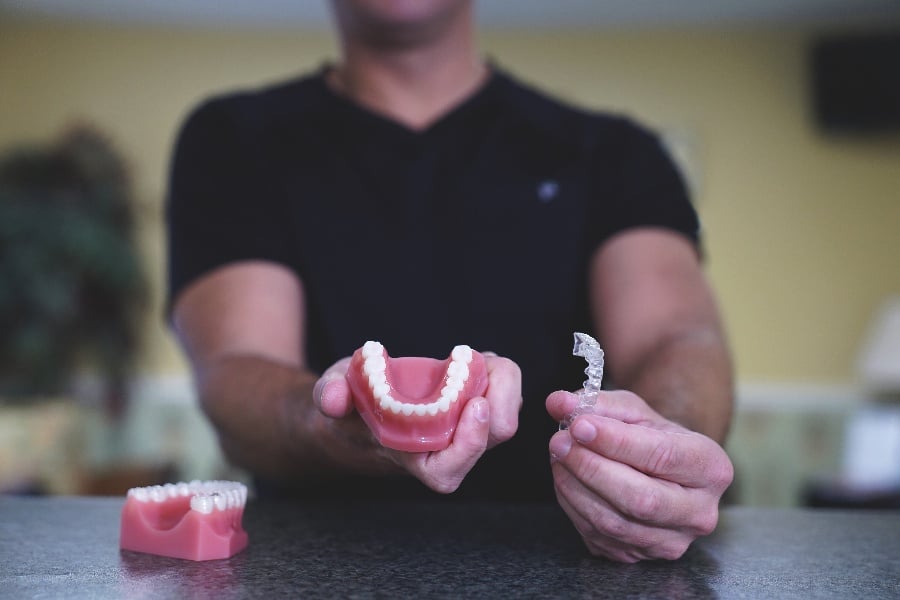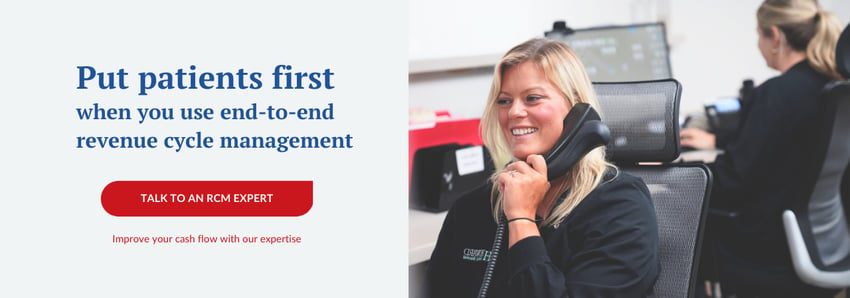Dental RCM services vs internal teams are like apples and oranges


Are you struggling to collect revenue for your dental business, but skeptical about investing in dental RCM services? You're not alone. It can be difficult for someone running a dental business to consider investing in dental RCM services, even when it’s a growing challenge to collect payments on their own. Why is this the case?
Those who prefer to manage revenue collection internally see several advantages for the dental business, such as:
- Control
- Communication
- Familiarity
- Flexibility
- Trust
These are real advantages. But RCM (revenue cycle management) is a complicated process that requires special expertise and attention. The way your revenue cycle is managed directly affects your processes, profitability, and your patient experience.
RCM services offer their own advantages. Comparing the in-sourced approach with RCM services will help you decide what best serves your dental business.
Since the pandemic especially, hiring the right person to implement RCM strategies in-house is a challenge in itself, which is why dental RCM services are effective solutions.
In this article, we’re comparing dental RCM services to in-sourcing. By explaining how each option works, you can determine which option will be most effective for your RCM strategy and dental business.
What is Dental RCM?
Dental revenue cycle management reduces the time between providing patient services and receiving payment. It maximizes income by identifying, collecting, and managing revenue throughout all dental business systems.
Related: Revenue cycle management 101: What it means and how it can affect your dental business
So what are dental RCM services?
Partnering with dental RCM services is a strategy your dental group would use to optimize your profitability. RCM services include:
- Provider credentialing
- Insurance verification
- Creating and filing clean claims
- Patient billing
- AR management
With your RCM managed by experts, the in-house team will be able to focus on providing a better dental patient experience.
What are the main differences between Dental RCM services and in-house revenue management?
Dental RCM services and in-house revenue management are different in their approach to managing your revenue.
Dental RCM service experts:
- Oversee the process as a whole, optimizing the entire process
- Focus on removing inefficiencies to maximize revenue
- Take a strategic view of revenue management for the practice
- Implement by adapting technologies to streamline and automate processes
- Manage financial health with a data-driven approach
- Focus on just the revenue cycle
Learn more about what RCM experts do by scheduling a call with us.
In-house revenue collection:
- Views revenue collection tasks as separate, distinct jobs
- Focuses on completing tasks, rather entire process management
- Focuses on the day-to-day operations
- Is implemented by working with team members:
- Overseeing the front office staff
- Managing schedules of team members & patients
- Handling and researching patient inquiries
- Manages overall financial health by looking a profit and loss
- Oversees revenue collection processes and everything else:
- Record keeping
- Patient scheduling
- Staffing or lack of staff
We’re not saying that what the in-house team focuses on is any less important. Of course, your in-person staff and patients need to be a priority. But if revenue collection takes a back seat in the meantime, you’ll start to see your financial health decline.

5 big benefits of partnering with dental RCM services
When you partner with dental RCM services, you’re not just reducing the administrative load of your in-house team. You’re also:
- Increasing efficiency. Your current billing processes will be modified by RCM experts in order to work for you, not against you. This will help the RCM expert and the in-house team to work better together.
- Improving cash flow. RCM experts will use their knowledge and technology to collect more from insurance claims and patients, resulting in more revenue for your business.
- Reducing billing errors. RCM experts are continuously trained and educated on dental billing best practices. You will face fewer insurance claims denials, and win more appeals.
- Providing a better patient experience. With your RCM being managed, your team can hone in on creating the best patient experience possible, without being bogged down by tedious administrative duties.
- Enhancing your dental business’ overall compliance. The RCM expert that works with your dental business will be knowledgeable on your state’s insurance law and regulations. They will work to ensure your practice remains compliant.
Read more: 10 benefits to outsourcing dental RCM services in 2023
In-sourcing revenue collection for your dental business
The staffing shortage has hit the dental industry hard, so in-sourcing your revenue cycle management will present a huge challenge.
Marko Vujicic, the chief economist and vice president of the Health Policy Institute at the American Dental Association says, “Roughly 40% of dental practices nationwide report having open positions and say they are looking to hire new staff members. Among practices with openings, 90% report it is extremely difficult to find workers.”
It’s not just about filling the position, you need the right person that can serve your dental practice, (or multiple dental practices) effectively.
When you partner with RCM services, you have a team of experts collecting more for you — this means fewer worries about hiring the right people AND paying overhead (salary & benefits).
Not to mention, if you’re a dental practice group owner and experience growth, you need the capacity to handle that growth. With RCM experts on your side, they will have the opportunity to nurture and expand on that growth.
Problems with in-sourcing dental RCM services
So let’s say you just want to fill the position of “RCM manager” or “biller” at your dental practice.
There are some other problems you will face:
- Increased spending on overhead. You’ll have to spend more on salaries, benefits, bonuses when you hire someone in-house to manage your RCM. You might assume that RCM services cost more, but they don’t. Read this cost comparison between in-house and outsourced RCM services.
- Lack of expertise. It’s hard to find experts in dental RCM, specifically. Dental insurance and billing are complicated and always changing. This isn’t the kind of role that can “learn on the job.” You need seasoned experts, or else your revenue could suffer.
- More time/resources spent training. If you do fill the role with a non RCM expert, you will have to spend more time, resources and money training them. During this learning period, who is managing RCM? That could be months of neglected processes and revenue.
- Reduced capacity for growth. Let’s say you’re a dental group with the goal of acquiring more dental practices. This means more processes and revenue to manage. Does your in-house team have the capacity and bandwidth to handle that growth?
Even if you are able to combat the staffing shortage, you could still face the same challenges presented above. If you are going to in-source, they must be proficient in the following topics:
- Dental insurance & billing regulations
- Dental billing best practices (both insurance and patient billing)
- Coding requirements (CDT, CPT, COB)
- Practice management software best practices
- Payer policies
If you are going to manage your RCM in-house, make sure you have each candidate go through a thorough vetting process to ensure you are getting the best for your dental business.
Dental RCM services are the future, and the best practice for optimized profitability
Medical businesses have been using managed RCM services for years, and now dental businesses are following suit. It makes more sense financially and professionally.
A few trends you can expect from dental RCM services in the future:
- Increased use of automation: As technology advances, RCM services do as well. Automated systems and technology platforms will continue to be explored to better serve dental businesses and their patients.
- Increased use of analytics: Analytics will play an increasingly important role in dental RCM services, as experts look to gain deeper insights into your revenue cycle performance and identify areas for improvement.
- Simplified processes: Dental RCM vendors will continue to simplify dental complexity using technology and evolving knowledge of the industry. This will make dental businesses’ workflows work together to increase revenue, instead of working against one another.
An RCM service partner provides access to expertise, insights, and resources that are out of reach for most practices on their own. These trends are all currently happening in the dental RCM vendor space, but will continue to evolve and show up in the future.
Move your dental business towards the future by using dental RCM services
While in-sourced solutions may have been a popular option in the past, dental RCM services is now gaining momentum and becoming the industry standard.
Dental RCM services offer a range of benefits, including increased efficiency, cost savings, and access to specialized expertise.
With the rise of value-based care and the growing importance of patient experience, dental businesses will need to adapt their RCM processes to stay competitive.
By partnering with a trusted RCM provider like DCS, dental practices can focus on providing high-quality care while leaving the complexities of revenue cycle management to the experts.
Schedule a call with one of our RCM experts to learn more.
Related Posts
Dental revenue resources from Dental Claim Support


